#FROM THE CARCASSES OF LITERATURE;
Text
manacled
tw: spoilers for manacled
this one will be long, so brace yourselves

I first read Manacled in 2020, and it must've been the third Dramione fanfic I ever read, so I was truly very impressed with how well written it was. It remained the best and my favorite fanfic up until I started rereading it recently, and I'm writing this rant because I just finished rereading Manacled for a third time and I have some thoughts.
Firstly, it's important to state that back in 2020 I was still a high-school student, I loved reading books, especially classic literature, but I had little understanding of why some pieces of literature become classics and others don't. I just liked reading, and just like many other people, I thought that fanfiction was bad because all I've ever known at that point was Wattpad. Manacled changed my opinion. It was the best thing I had ever read, but I was only nineteen.
Now I am twenty-three, I have a degree in English literature, and although it might mean nothing to some people, it proves to me that I can read and understand texts as well as view them critically - my degree gave me tools to approach things I read and see using critical thinking skills. I don't want to critique Manacled because I think that all fanfiction is a wonderful gift that writers give readers for free, asking nothing in return, and that is such a lovely concept, so please keep that in mind when you read and review fanfiction. My critique stems more from what Manacled tells about the way we read classic literature, books in general, and how we deal when we face dubious morality. There is a thin line between books and literature - sometimes that line doesn't even exist. All literature is books, but not all books are literature. Just like all books are texts, but not all texts are books. What is Manacled then?
I'm choosing to speak about Manacled because I think it does a very interesting thing. It is an intertext of two books - Harry Potter and The Handmaid's Tale. Both of them are books, only one of them is literature, however in Manacled they are treated the same.
The Handmaid's Tale is a gruesome novel about a dystopian world where fertile women are slaves to men, their ability to bare children used as a weapon to exploit them. As the author herself, Margaret Atwood, stated, everything depicted in this novel had in some place or some time actually happened to women.
Rape in The Handmaid's Tale is a way for men to demonstrate how much power they have over women, and how they use that power to humiliate and control every aspect of women's lives, especially their reproductive health. Manacled picks up the very carcass of the story of The Handmaid's Tale and inserts it into a dark AU Harry Potter universe where the second wizarding war with Voldemort still continues some years later. Whereas The Handmaid's Tale is a thought-provoking feminist masterpiece about women's struggles and the never-ending violence perpetuated within walls of patriarchy, Manacled focuses solely on one woman and one man. The woman being Hermione Granger who is forced to bear Draco Malfoy's child in order to get her memories back, so Voldemort could rule forever. Later on, we figure out that Hermione and Draco were actually in love, but war set them apart, and it's him Hermione tried to protect by erasing her own memory. Here lies the distinction. Not only does Manacled say nothing about feminism and how women's bodies become war battlefields for, most often, men. Not speaking up on something in the intertext is absolutely nothing wrong. But Manacled does something else, something that I now see so clearly upon rereading, and something which I can neither forgive nor forget. It romanticizes rape. You might say I'm being too callous saying that it romanticizes rape when it is simply depicting in, and I will explain why I chose the word romanticizes.
Although Manacled doesn't allow us to attribute good or bad traits to characters, it is still very clear that Hermione is the heroine in this story and Draco - the hero with antihero characteristics. How do we deal with the fact that our hero hurt our heroine? We look for excuses. Draco Malfoy rapes Hermione, and we're looking for excuses as to why he did it. Some excuses are these: he did it because he loved her, because if he hadn't raped her, Voldemort would've found out that they were hiding something, and then would've killed them both; he did it, but it hurt him even more than it hurt her (it is true that both the victim and the perpetrator might be equally traumatized by an event one caused and another had to suffer through, but it never excuses the perpetrator); and finally - he did it because he had no other choice. Side tangent, but if my loved one ever has to choose between murdering me or raping me, I hope they kill me. Murder me a million times before you rape me once, that will be a greater mercy. And I believe had Draco actually loved Hermione as much as he claimed, he would've murdered her before he laid a finger on her. Let's also have in mind that he rapes her not once, not twice, but over THIRTY times.
While The Handmaid's Tale tirelessly shows that rape is the worst thing that one person can do to another, Manacled, with all its horrifying depiction, claims the complete opposite. Draco Malfoy rapes Hermione Granger, and although he doesn't take pleasure in it, he still does it. We find excuses for it because he is a hero of the story in our eyes, the same way that we find excuses for our favorite famous men when we find out they committed atrocious acts especially against women. When we read Manacled, we are encouraged to believe that rape is sometimes unavoidable, which is the greatest lie of all, it is blasphemous. Because it's Draco Malfoy committing the rape, it seems that sometimes a person has no other choice but to rape another which is a complete antithesis to what Margaret Atwood, and many other modern feminist thinkers claim. Of course, we don't need feminst thinkers to tell us rape is bad, but we might need to think a little deeper to understand that it is never something one has to do.
Rape is always avoidable, never necessary. It is perhaps the only crime that is committed not for some particular reason, but solely because one person wants to hurt another. Murder, theft, these are the crimes that a criminal might commit because they're poor, because they're are being blackmailed, because it's self-defense, etc. However, rape is such a horrifying crime specifically because you can always choose not to do it, and specifically because it is so hard to recover from - rape victims suffer more extreme and longer-lasting cases of PTSD than victims of any other crime because rape is so horrible and death might be considered dignified compared to rape, not better, but more merciful than rape. Draco Malfoy might be a lot of things in Manacled, but one of them is a rapist, and there is simply no going on around it. If you can forgive him, I hope it's because of all the other fanfics you've read where he was good and kind, and not because here he had no other choice but to rape, because that is simply not true. He had a choice, many choices, to be exact. The choice is always there. The most important thing is what we choose.
This is in no way an attack on Manacled, it is not a review nor is it hatespeech - I thoroughly enjoyed this fanfic back when I read it the first time, and I do think it is incredibly well-written, and I am not comparing it to any other published works because that would be unfair. I believe the things I've talked about have more to do with what regular people who are not writers write and how regular readers who do not read classics all the time accept and discuss that work later on. Anyone could've written something romanticizing rape, and many people do it all the time, some even get published and make money off it, but not all people can write as well as the author of Manacled, and even less would be ready to give us their work to read for free. I purposely do not mention the pseudonym of the author because I am also not attacking them personally, simply pointing out what I've noticed. Thank you for reading all the way to the end.
#feminism#intersectional feminism#the handmaid's tale#margaret atwood#manacled#dramione#dramione fanfiction#critical thinking#literature#booklr#text#writing#sociocritisism#hermione granger#draco malfoy#high reeve
83 notes
·
View notes
Text
Dune Frank Herbert
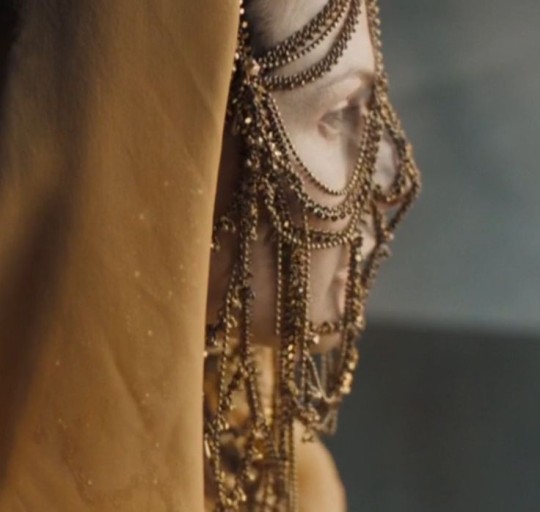
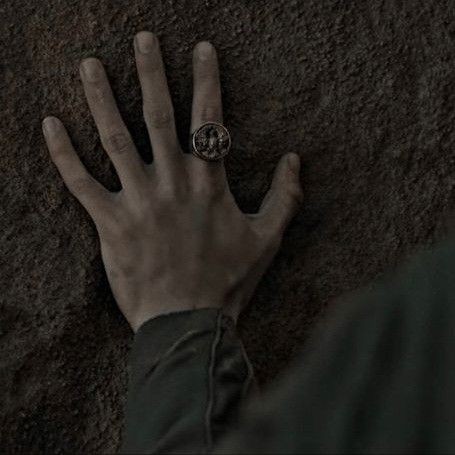

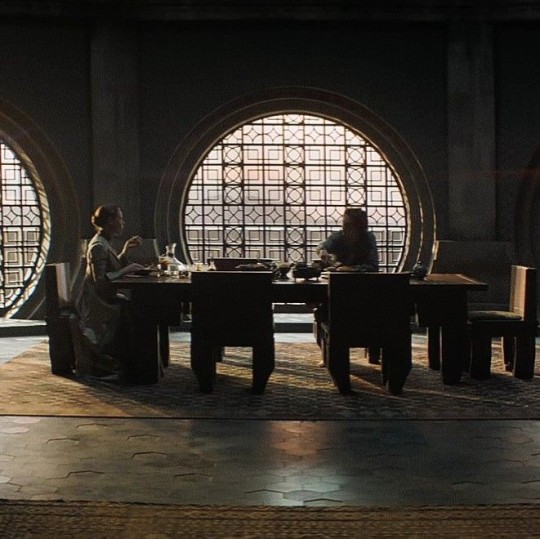
“Dune" is, without exaggeration, an era, a magnitude in literature that is difficult to overestimate. A science fiction saga, with elements of the novel of chronicles and adulthood, space opera and dystopia, metaphorical narrative full of philosophy and mysticism.
The first trilogy of the classic cycle is full of the life and life of a free people, the planetary ecosystem including the giant worms, echoes of courtly strife, the structure of organizations equally ruling the Known Universe but also dependent on the spice that is produced only on Arrakis.
High and intense text full of concentrated substrate based on religion, politics, ecology, legal and cultural issues, immediate survival, while learning about the future.
The plot is fascinating, like standing in the center of a huge temple complex in Kornak, where the desert wind brings the essence of plans within plans.
Compared to the TV series and screen adaptations, the book predetermines the accents in relation to the characters, making them full and vivid, clear in plot twists, meeting the author's intent and the logic of behavior under given conditionsThe story itself I really liked, probably partly because I generally love fiction and somehow have not read something interesting and non-anal of this genre for a long time. A lot of fiction books are based on Christianity, and this is the first book in my memory that is based on Islam.
I also like the way Frank Herbert describes the characters' looks - almost without details, leaving room for imagination. The story is not long, lively enough and colorful enough, and I have experienced this forgotten feeling again and again, when I want to return to the book to find out what is going on.One of the main themes is the opposition between the houses of Atreides and Harkonnen. In these quotes, a clear example of the difference between the houses: the Atreides pay love for loyalty, while the Harkonnens gain submission through hatred. 'How much he talks! - Hawat thought. - This is not Duke Leto, who could speak to me with a wave of the hand, a movement of the eyebrow. What a carcass! The author (maybe the translation) shows Vladimir Harkonnen as a huge carcass, which has accumulated large reserves of precious water. This is the main peculiarity of the desert Arrakis. Arrakis. A desert planet, also known as Dune. There, under the scorching sun, there float huge worms on the sand, from which it is impossible to hide. There’s a free folk out there - Fremen with blue-tinted eyes that cover even squirrels. And, most importantly, Arrakis - the only place where the spice is extracted. Spice or melange - the most important wealth in the universe. If water is commonplace on Kaladan... here, in the desert conditions, its value is high. To show your respect, love, loyalty, you must share water. Whether it's spitting or mourning the dead. One of my favorite characters is the planetologist Kynes, who dreamed of turning the desert into an oasis. His father managed to plant and implement this idea among the Freemen, and his son continued his work ... Freemen are a hardened people of the desert with their own philosophy and way of life...they were told that the work of greening Arrakis is labor-intensive and the results can be fully appreciated only by the eighth generation. Not only that, but the Freemen and the Kynes did not abandon it, but passed it on from generation to generation. Valuable and very much appreciated. Chani is a great representative of the Freemen. Honestly, I didn't really understand why Jessica didn't think she was a good match for her son, even though she thought she was a worthy representative of the Bine Gesaerit school. Chani is wise, intelligent and loving to Paul. She is such a reliable and strong support for him.In general, the novel is a very interesting story, competently combining social problems, political peripetias, religious ascents, life philosophy, many multi-layered mysteries, and I think, even some meditation.And all this cornucopia is doused in beautiful, smooth, syllable with detailed, distinctive style descriptions that include perfectly developed characters. I wholeheartedly recommend the novel, I don't know if I'll be able to experience all six books, but I'm now serious about part two. For anyone interested, I recommend that you be patient and take your time with this story, getting to know it at your own pace.
#aesthetic#light academia#romantic academia#academia aesthetic#chaotic academia#classic academia#dark academia#dead poets society#book review#donna tartt#dune movie#dune#dune books#reading#books#book history#fantasy
24 notes
·
View notes
Text
It Came From The Trash Heap (We Don't Talk About Kholumolumo)
A wastebasket taxon is what happens when species can't be easily classified and instead get hurled into a "catch-all" category.
…But that's not the only kind of taxonomic tangle that can befall a new discovery.
When a scientific name is assigned to a new species, but it isn't given a corresponding formal description and type specimen, it becomes a nomen nudum – a "naked name". Without a proper description and assigned holotype the name isn't valid, and the new species isn't technically accepted by the wider scientific community.
This has even happened to some surprisingly famous names. In the 1920s Velociraptor mongoliensis was briefly given the nomen nudum "Ovoraptor djadochtari" before getting its much more familiar name when it was officially described. Meanwhile the giant pterosaur Quetzalcoatlus northropi was stuck as a nomen nudum for decades, only finally getting a proper published description in 2021.
And there's another particular long-standing nomen nudum that became mildly infamous – "Thotobolosaurus", the "trash heap lizard".
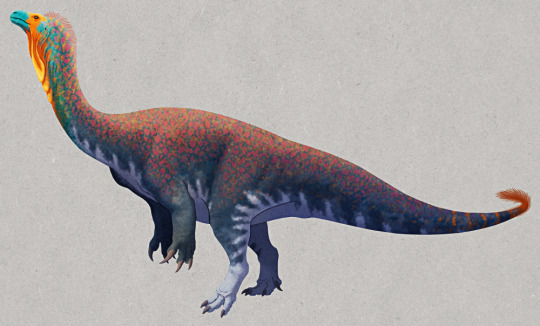
Discovered next to a literal trash pile in the village of Maphutseng in Lesotho, a few scattered and broken bones of this "prosauropod" sauropodomorph dinosaur were first found in 1930. But it wasn't until the mid-1950s that a more extensive bonebed began to be unearthed at the site, and over the next decade over 1000 fossil fragments were collected.
In the mid-1960s the remains were initially classified as belonging to Euskelosaurus browni (which is now considered to be a wastebasket taxon), but just a few years later in 1970 the "Maphutseng Beast" was re-evaluated as a species new to science. It was referred to as "Thotobolosaurus mabeatae" – based on the local name of the discovery site, "Thotobolo ea ‘Ma-Beata" (trash heap of Beata’s mother) – but this name was never actually formally published.
Despite "Thotobolosaurus" being an undescribed nomen nudum it nonetheless went on to be repeatedly referenced in scientific literature over the next few decades, and appeared in several popular dinosaur books (even as recently as 2020!).
In the mid-1990s it was alternatively named "Kholumolumosaurus ellenbergerorum" in a Ph.D. dissertation, with this name derived from the kholumolumo, a reptilian creature in Sotho mythology, and the Ellenberger brothers who worked on the site. But this also didn't count as a formal publication and instead became a second nomen nudum for the species.
Eventually, 90 years after the first bones were found and 50 years after the debut of the name "Thotobolosaurus", this long-neglected sauropodomorph was finally given a proper published full anatomical description in 2020.
And it also got a third name, this time officially valid, based on the second one from the 1990s: Kholumolumo ellenbergerorum.
For something associated with trash for so long, Kholumolumo is actually now one of the most completely-known prosauropods. At least five different individuals were present in the collected fossil material, possibly as many as ten, and between them most of the full skeleton is represented – with the exception of the skulls, which are only known from a couple of small fragments.
We now know Kholumolumo was rather heavily-built, with chunky limb bones and unusually short shinbones. It would have been one of the biggest animals around in the Late Triassic (~210 million years ago), measuring at least 9m long (~30') and weighing around 1.7 tonnes (1.9 US tons), but despite its size it seems to have still been bipedal.
Due to the highly disarticulated nature of the bones the fossil site may have been a "bone accumulation area", a place where dismembered bits and pieces of different carcasses were regularly carried to be eaten by a predator or scavenger – essentially a trash heap, fittingly enough. A couple of "rauisuchian" teeth have actually been found among the remains, which might indicate what was chomping on these particular Kholumolumo.
———
Nix Illustration | Tumblr | Twitter | Patreon
#it came from the wastebasket#nomen nudum#taxonomy#kholumolumo#thotobolosaurus#prosauropod#massopoda#sauropodomorpha#dinosaur#paleontology#art#science illustration#paleoart#palaeoblr
290 notes
·
View notes
Text
Azazel
The name Azazel only occurs one time in all of the canonical Bible, in Leviticus 16:8-10. As the Catholic Encyclopedia records, this passage explains the ceremony that the Jewish people should perform as part of Yom Kippur, the Day of Atonement.
As a personification of evil, the Jewish Encyclopedia refers to Azazel as "in some degree a preparation" for the idea of Satan. The figure of Azazel is likely pre-Israelite in origin and is probably closely tied to a communal fear for the mountainous desert region that he came to personify.
According to the Nahmanides the scapegoat rite is a symbolic expression of the idea that the people's sins and their evil consequences were to be sent back to the spirit of desolation and ruin, the source of all impurity.
1 Enoch portrays Azazel as responsible for teaching people to make weapons and cosmetics, for which he was cast out of heaven.
In the extra-canonical text the Apocalypse of Abraham (c.1st CE), Azazel appears as an unclean bird who came down upon the sacrifice which Abraham prepared. (This is in reference to Genesis 15:11: "Birds of prey came down on the carcasses, but Abram drove them away" [NIV]).
In the Apocalypse of Abraham, Azazel is described with his own Kavod (Magnificence), a term usually used for the Divine in apocalyptic literature, already indicating the devil as anti-thesis of God, with the devil's kingdom on earth and God's kingdom in heaven. Azazel is also identified with the serpent which tempted Eve.
In De occulta philosophia (1509-1510), Heinrich Cornelius Agrippa: Scale of quaternary: Four Princes of devils in the elements: Azazel: Air
In later lore, he is fallen and is punished by having his nose pierced.
The word "scapegoat" has developed to indicate a person who is blamed and punished for the actions of others.

The illustration depicts him with horns, a pitchfork, a banner, and, of course, a goat. There's a frog on the banner. From Dictionnaire Infernal by Jacques Auguste Simon Collin de Plancy
Alternative Spellings
Hebrew: עֲזָאזֵל ʿAzāʾzēl
Arabic: عزازيل, romanized: ʿAzāzīl
Asael
Azael
Azazyel
Azzael
Epithets
The Adversary
Advisor
The Angel of Darkness
Blender of Eyeshadows
Counselor
The Crafty Adversary
The Crafty Worm
The Cunning Worm
The Fallen Archangel
Forger of Swords
Guardian of Goats
The Lawless One
The Rebel Angel
Seducer of Mankind
Identified With
The Devil
[Apocalypse of Abraham] Here there is the idea that God's heritage (the created world) is largely under the dominion of evil – i.e., it is "shared with Azazel" (Abr. 20:5), again identifying him with the devil, who was called "the prince of this world" by Jesus. (John 12:31 niv)
Gadriel and Rameel
Some of the fallen angels that are given in 1 Enoch have other names, such as Rameel ('morning of God'), who becomes Azazel, and is also called Gadriel ('wall of God') in Chapter 68. (A source is not cited for this)
Gadreel (Hebrew: גדר האל, romanized: Gader ha-el, lit. 'Wall of God') is listed as one of the chiefs of the fallen Watchers. He is said to have been responsible for deceiving Eve. Schmidt lists the name as meaning 'the helper of God.'
Iblis
In Islamic lore, Azazel or Azazeel was the name of Iblis before he disobeyed God by not bowing to humans and was sent from the Earth.
Satan
Origen ("Contra Celsum," vi. 43) identifies Azazel with Satan.
Azaz, as in Azazel, means strength, so the name Azazel can refer to 'strength of God'. But the sense in which it is used most probably means 'impudent' (showing strength towards), which results in 'arrogant to God'. This is also a key point in modern thought that Azazel is Satan. Also important in this identification is the fact that the original name Rameel, is very similar in meaning to the word Lucifer ('Morning Star') which is a common Latin name of Satan in Christianity.
Associated With
Alchemy
Antimony (use of)
Beauty
Coloring tinctures
Cosmetics
Cunning
The earthly realm
Fatherhood
Forbidden knowledge
Freedom of choice
Goats
Dye making
Herbalism
Knowledge
Magic
Marriage
Metallurgy
Metalworking
Mirror making
Occult arts
Ornamenting the body
Pleasure
Pride
Rebellion
Scapegoats
Seduction
Self preservation
Sensual experiences
Sexuality
Temptation
Warfare
Weapon making
Wisdom
Witchcraft
Attributes
Abyss, hole, pit
Air
Antimony
Banner with a frog on it
Black
Bracelets
Breastplates
Chain
Coats of mail
Cosmetics
Darkness
Desert
Dragon
Dudael, Dûdâêl (God's Kettle/Crucible/Cauldron)
Dye
Fallen/falling star
Fire
Goat, goat skulls, goat bones
Grapes, grapevine
Herbs
Jewelry
Knives
Metals
Metalsmithing tools
Mirror
Mount Azazel (Jabel Munttar) in the Judaen Desert
Nose piercing
Precious stones
Red
Rough and jagged rocks
Serpent
Shields
Swords
Unclean bird, bird of prey, carrion bird
Uninhabited places
Weapons
Wilderness
Depictions
His form is described as a dragon with "hands and feet like a man's, on his back six wings on the right and six on the left." (23:7)
Originally, Azazel was one of heaven’s angels, a gloriously beautiful man with wings on his back.
Today, like many demons, Azazel is drawn with red skin, glowing yellow eyes, and a barbed tail. He may also be found wearing goat skulls or dressed in goat bones.
He is a shape-shifter and may appear in any form, including a winged angel.
An unclean bird, bird of prey, carrion bird
184 notes
·
View notes
Text
I have read the autobiography of the man who was no longer human. The walking corpse of a soon to be suicide.
I have read the story of Oba Yozo. And also the story of Osamu Dazai.
I have noticed the similarities. Dazai's tendency to leave not just fragments but whole morsels of himself in his work. Is it a way to explore his own psyche ? To try to understand himself? To make the readers feel what he felt? To validate his own emotions?
Oba Yozo wasn't a good man. He drank and drank and wasted his precious life away. He mistreated women and only used them to satisfy his own needs. That part we all agree on. That's somewhat the part that most of booktok grasped from the whole three notebooks that recounted his life. They saw him as he saw himself. Nothing but trash. Nothing but an empty carcass. Something that is not human and that has never been human. Now here's what I think: I think that when read literature, it is not to judge someone's character and choose whoever's right and whoever's wrong. It is not to point fingers and "cancel" characters. The point of literature is to push us to analyse those characters, it makes us want to delve into their mind and dismantle their every thought and try to make sense of it all. And that is the beauty of it.

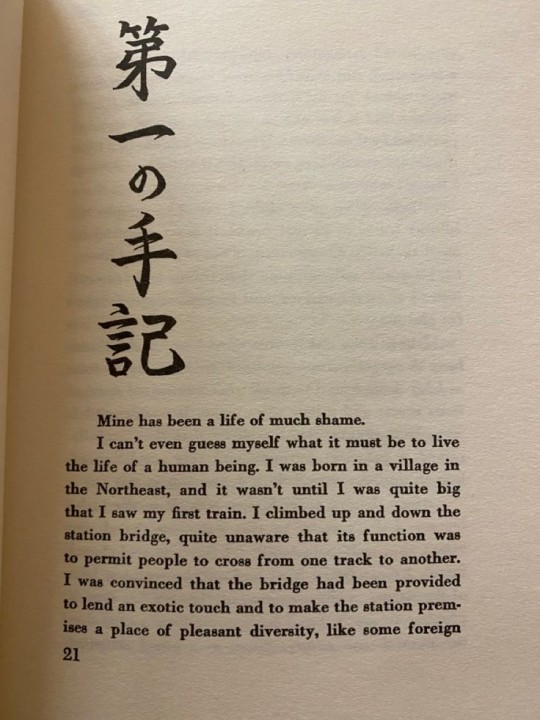
Now let's go back to our man.
Yozo was very much human. His humanity resided in the fact that he was scared. He was deeply scared of how people would perceive him. It started when he was young and wondered about life and traditions and why his father was a sacred figure to him, how he was too afraid to disappoint him. It was the lack of communication and reassurance from his parents that helped nourish this social anxiety and pushed him to perfect his "people mask" only to be trapped by it to the point of believing that he is nothing, a mere monster without that mask. So he continued on with his people pleasing and took up drinking to escape the mental disorders that came with it. And that was his downfall.
There was a point where I looked for who I should blame for the way that he is. I was even inclined to diagnose him with sociopathy but I felt that it was unfair to do so. He was the result of his own thoughts and his environment.
Although short, it took me a while to finish the book. I had to read it bit by bit to feel it all the way he did. It broke my heart many many times. It broke me when he prayed to God for one more moment of happiness, no matter how gut- wrenching the misery that will come after it. He believed that the bare minimum for someone to feel human is to be happy. Even for one moment. And the fact that he never felt happiness nor unhappiness deprived him from that title.
Did he really never feel happy? Or did he do whatever is in his power to be as far away from it out of fear? Out of fear of loss ? That the pain of losing said happiness would destroy him ? Then why did he pray to God in that way ? Was it because it was his last shred of fate that he was willing to offer up ? Was it his last chance at life ?
And you know what destroyed my heart the most? It was how he ended up getting a taste of that happiness, and he lost it. And he felt that despair. And he lived on in misery.
Now what did I think of this book.
I thought it was brilliant. I loved how straight forward it was, how Yozo shared his deepest thoughts in the notebook and how it was given to us raw and untouched.
I also found traced of Dazai all over it. And not just because he was the author. But because it was very much like his life. It was all too similar to miss.
This book felt like a confession. It felt like despair and deep deep sadness. It felt like a memoir with a suicide note aftertaste. To think that it was Dazai's last book before he went to other side only confirms my feelings.
All in all, it's one of my favourite books to date, it's been annotated and loved and cared for and I appreciate the person who gifted it to me.
11 notes
·
View notes
Note
Exactly, Del Toro didn't call his movie The Creature Of The Black Lagoon nor claimed it'll be so much better or that it's for the first time the Real Story. He named it The Shape of Water, with original characters, even if it's based on the classic.
Even with Pinocchio he didn't make Geppetto an evil father or the fairy a twist villain or try to subvert everything about it. He respected the characters and gave the story a different dimension, and while it's darker it's not edgier.
^^^
Guillermo del Toro is someone you can trust on both sides of the public domain line. He can lift up the original without gutting and destroying the point of the story or bastardizing the characters. He can also recognize when an opposing story has more potential than an outright adaptation, and so invents a new background and new characters to illustrate it rather than obliterating the story that inspired him.
That's the key word I think a lot of the adapting/bastardizing writers are missing in their vocabulary.
Inspiration.
Dracula and other classic gothic literature have inspired tons of new works. Some that are outright spectacular! Some are so close a loving mimic to the originals that they might pass as an adaptation themselves, ala Nosferatu. But others do go absolutely hog wild with their own cast and backdrop, though the skeleton of the story format remains the same.
And that is where the folks who stuff the Count's carcass with their personal fantasy roleplay go so wrong.
Either they've deemed past poor adaptations good enough fodder or they just really like the easy cheat of waving a famous public domain name around as a hook for the audience, but they simply refuse to just let their OCs be OCs.
Dracula inspires you? Dracula's adaptations and spinoffs inspire you? Great! But if they're inspiring you to make a story in which none of the characters, the plot points, or, you know, anything from Bram Stoker's novel Dracula has even a scrap of reference beyond 'there's vampires and we kept the names' then do not call that an adaptation! Do not call it a spinoff!
Make! Your! Own! Shit! Stop trying to peddle your version as some enlightened and Subversive (a word that should be taken away entirely from these guys) take that is almost always ten steps backward compared to the shockingly progressive elements Stoker planted in the book! In 1897!
Anyway.
Yeah, Guillermo del Toro good. Bastardizing faux-adapters crap. Head hurt. Going to go scream into the void now.
#I honestly feel like my head will crack apart one day from sheer anger over this exact thing#ugh#dracula#guillermo del toro#adaptation#bastardization
34 notes
·
View notes
Text
Tag Game! (I found this randomly on my dash)
Twenty Questions for Fic Writers:
I legit found this randomly from someone I don't remember following, but y'know. Here you go
How many works do you have on AO3? 126. I might have a slight issue. Most of them are MHA.
What's your total AO3 word count? 294,834.
What fandoms do you write for? My Hero Academia mostly, Doki Doki Literature Club, OMORI, Miraculous Ladybug once and I have two Breath of the Wild/Tears of the Kingdom fics.
What are your top five fics by kudos? N°1: Eraserhead Fanbase (Or How 1-A Grows), N°2: A Child's Spark Light Up The Night, Constant Search For Approval, Suffocated By Refusal, N°3: Don't Blow Until The Wind Does, N°4: Safety, N°5: Moonlight. Apart from the first one, these aren't necessarily my favorites because they're older, but y'know. I might rewrite them a bit, since people apparently like them.
Do you respond to comments? Why or why not? I try to, I often do not. I don't have the mental strength to do it consistently and I don't really know what to say anyways. I'm trying to answer a bunch of them right now though. I do look at them and notices regular commenters.
What is the fic you wrote with the angstiest ending? Oh boy. Probably one in my Dead doves (to eat) series. And then in here... Talking only about what happens and how many people are fucked up by it in the end, Poor Crazy Hitoshi, I'm Choking On Stardust, Becoming a Carcass and save me! (walk away) are probably the worst ones.
What's the fic you wrote with the happiest ending? Well that's harder. Open, bad or unsatisfying endings are what I do (please don't run away). But I guess Happiness is warm, I'm not dead! And Other Such Entries and a hood and wings might be contenders.
Do you get hate on fic? Maybe once, I think. I delete comments that I find disrespectful, but I don't delete much, so I guess I must be okay.
Do you write smut? Occasionally. Or well, I post smut occasionally. I write a lot of it.
Do you write crossovers? I do not.
Have you ever had a fic stolen? I hope not, oof.
Have you ever had a fic translated? Nope.
Have you ever co-written a fic before? Don't think so?
What's your all-time favourite ship? I'm a chronic multishipper, but according to my works on Ao3, it's bkdk, and according to my bookmarks, it's erasermic. Do with that what you will.
What's a wip you want to finish but probably won't? Oh boy. Do you want to know how many wips I have? Me too. It's more than a hundred. I have no idea.
What are your writing strengths? Uh. Dialogues? Maybe? It's the thing I write the most easily. Maybe mental breakdowns. Someone tell me.
What are your writing weaknesses? I can't write multichapter fics for the life of me.
Thoughts on writing dialogue in another language in fic? Depends on the context. If it's a hidden message, a joke, or ultimately unimportant (as in, the goal is to see a character is talking another language and not what they're saying), leave it untranslated in the body of the fic and either put the translation in the notes or don't. Otherwise, I guess either just say X character is talking a different language at Y point, or put the text in italics to signify it's being said in another language but translated in English.
First fandom you wrote for? My Hero Academia, most likely. Or actually, maybe Gravity Falls.
Favourite fic you've written? Ehehe. The author's favorites.
@sillypilled-friendcel @lollybliz @any writer who might see this, feel free to try.
5 notes
·
View notes
Note
Hi Orfeofriend <3
Excuse me marching in here unannounced. I decided to send some asks, and well, I thought that perhaps you might also like these questions. (Feel free to answer in your own time or ignore as your spoons allow. <3)
I know we love to talk about breaking the rules in writing and obviously, that not every piece of advice is one-size-fits all, but there is a lot to say about being able to speak with each other about what we have learned during our journey. I was wondering if you wouldn't share. (I also plan on poking some of the others to see what more we can shake out. The more the merrier, no?)
What is the most useful/helpful pieces of advice you ever received during your formal education in relation to writing?
Once you started to write, what was the most important thing that you learned about writing or its process?
Has your real life had any influence on your writing? If so, how?
What advice would you give to aspiring writers (be it fanfiction or original)?
Thank you so much for the ask Winter! I love sharing these things with fellow writers, it makes me so happy, so this is really welcome. Sorry it took me so long!
1. I don't have a formal education in writing other than academic pieces (dissertations, publications, etc), but I think what helped me is "read things aloud". Both for flow and for style, it was so helpful!
2. I learned to not care. If it sounds good to me, I do it. This may sound like bad practice, but Shakespeare made up words, and every theory was made up by someone at some point. If I want to create a new turn of phrase that sounds strange but makes sense to me, I will. This is where being trilingual helps a lot, because I take from multiple languages and find the beauty in each of their structures, so I can import onto another language, like a graft.
In this scene, for example, I use Spanish structure in English, and I think the result is so intense!
She, in all certainty, lacked the will to perceive them as anything other than the sad attempts they made to rule over sacred wilderness rather than form a covenant with it, as she knew Holy, so she hunted and assembled her shelter and supplies out of those carcasses. Bone, sinew and skin were all she needed to survive the inclemencies of Skyrim’s weather.
3. Absolutely! I don't believe you can make anything without your real life influencing you. Art doesn't occur separately from your life, it's inscribed in it and its circumstances. I always learn new things, go through new experiences, meet new people, etc, or even read new things that inspire me! I have a rich life, and so my writing draws from it and is enriched.
4. Don't listen to anyone who says "don't write in an overly flowery way". If you like it, write like that. Do purple prose, abuse the thesaurus, include obscure references to things that only make sense to you. Look for the perfect word. And READ! A writer who does not read (and I'm talking about strong literature, not just things meant for kids and teens, or in-game text) will stagnate. Include Non-fiction In Your Reading Diet. Or else. Non-fiction is so important. Read writing theory, art theory, epistemology, other sciences. Read! Read! READ!
10 notes
·
View notes
Text
sometimes i feel like a reanimated rotting deer carcass covered in maggots with a ribbon on it reciting quotes from literature and telling everyone 'life is meaningless, i love you' while looking like i might run away or maybe just evaporate and then i have a nap.
3 notes
·
View notes
Text
It took me a while to write, but since my outline of Wilan's story was so well received (thank you!) I finally got around to writing an synopsis of my other FFXIV OC, Delen. Again this will just be a very short rough rundown, but if what you've read of my little blorbos sounds interesting to you consider checking out my ongoing collection of fanfics involving them, Tales from Beyond the Horizon, especially if you're into introspection.

Delen Aldanea was born in a Garlean occupied Terncliff, the former capital of what once was the nation of Werlyt. Her father had been conscripted shortly after her birth and would find death while being forced to take part in the push to conquer Eorzea, which left Delen's mother to grow her by herself.
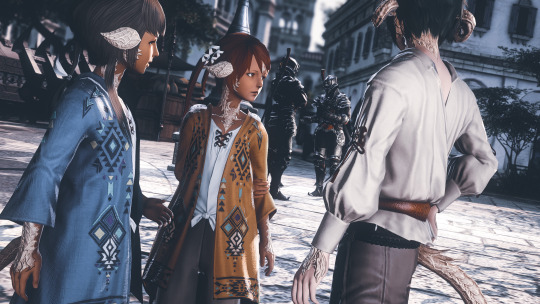
Growing up under the occupation meant the young Delen received a formal Garlean education, as part the edict mandated by the regent Gaius van Baelsar. She is versed in Literature and visual arts of the Empire as well as its History, at least the emperor-approved version of events.
Being educated with what amounted to blatant propaganda though didn't quite manage to win the girl's loyalty, nor that of many of her peers brought up outside of one of Gaius's notorious orphanages. Baelsar's soldiers enforced a strict curfew and were particularly plased to punish those stepping out of line. Any word of dissent, any tale pertaining to how life used to be better before the occupation, had to be exchanged in hushed whispers.
In this hostile environment, Delen quickly learned not to draw any unnecessary attention upon herself. She was a calm, quiet and unassuming girl, and despite having a sharp mind and strong opinions she had learned the value of biting her tongue and keeping quiet. She would often spend her days listening to the radio, or looking out at sea from one of the city's many vantage points, cradled by the sound of the waves clashing against the cliffs.

Then, Baelsar fell.
The news of the Black Wolf's demise during his campaign to conquer Eorzea reached Werlyt like a shockwave, throwing everything into chaos. Whispers and rumors celebrated a mysterious figure known as the Warrior of Light as their benefactor, and while even catching glimpses of such debates would have warranted extensive punishment from the guards, in the wake of Baelsar's death the entire administrative system of the imperial province was scrambling to get things under control, to appoint the next Legatus of the XIVth legion.
For many, that was the chance to escape.
The smugglers flocked attracted by the carcass of Baelsar faster than any humanitarian help could. The chaos wouldn't last long, and despite their prices being outrageous, many werlytians preferred to pay them rather than risk losing their chance.
Delen's mother was one such people. She got word that the smugglers would be rounding up people by a beach below the cliffs in a few nights, and she and her daughter got rid of everything they could sell to put together enough money to afford the journey. Their house, their furnitures, their good clothes, whatever few jewelry they had, even their red hair they sold to the garlean wigmakers.
And they barely put together enough money for one.
Some time later, still in shock and barely aware of her surroundings, Delen disembarked from a boat onto the coasts of Eorzea. Around her there were plenty of voices, many of them in languages from the colonies in the far east she couldn't recognize, but none of it seemed to get through to her. As the other travelers, weary and tired from the long journey, started boarding caravans for one last stretch toward Ul'dah, Delen wandered off, sat on the edge of a dock and stood there, looking out at the sea, crimson from the sunset, gazing into the distance as if looking for all that she left beyond the horizon.
She didn't know it. As the night came to board the boat that would smuggle them to open waters, Delen was shocked to see her mother stay behind, to be denied boarding.
She choked off a scream as she heard the guards catching her on the shore and executing her on the spot.

It was there that she was noticed by an adventurer, there to help the refugees in that step of their journey. He approached her, introduced himself as Wilan, a name that made her heart skip a beat, but she would otherwise remain silent. Determined to reach out to her, unable to convince her to rejoin the others, and somehow acting as if he was eerily aware of the tragedies that had befell her, the man offered Delen a place to stay at his home despite barely knowing her, and even to "employ" her as an assistant to aid her in her immigration paperwork.
Not too long after, signatures were placed, and he brought her home, in Vylbrand. However Delen didn't feel rejoiced by this turn of events.


Once alone, once that house's door had closed behind them, she lashed out at him, violently lamented her misfortunes, of having attracted the attention of none other than the Warrior of Light, the killed of Gaius van Baelsar himself, a person of considerable power she couldn't oppose, somebody who abused her weakness to make her his slave.
That his country's supposed benefactor would turn out to be yet another jailer, that was too much for her. She finally broke her silence and lashed out at him.
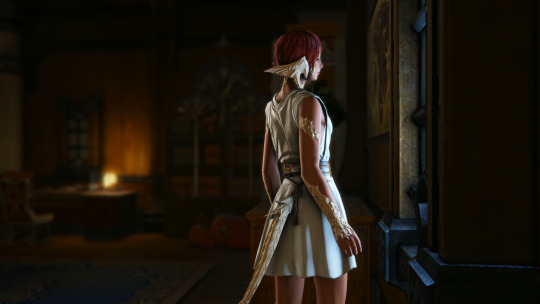
Wilan, who had spectacularly failed to view things from her point of view, tried in vain to tell her she had the wrong of it. She refused to listen, it all appeared clear to her without needing words to muddle things. She locked herself in a room.
That night, they both had a lot to think about, and while going over the events of the day and some of his belongings, she started to warm up to the idea that maybe he wasn't the monster she believed him to be.
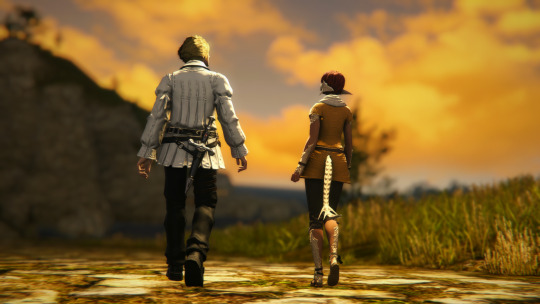
She woke up the morning after to Wilan's apologies. He had been too impulsive, done things without thinking. He'd provide a meal for her, and then he would make her paperwork void so that she'd have no bonds with him, and in that case he'd try to recommend her some other place to go where she could find work.
But she had also made up her mind from the night before. Now that things were calmer, she could indeed see this Wilan, Baelsar's grandiose dethroner, as a simple but well-meaning man.
She ended up agreeing to his offer, on the condition that she could actually earn her pay.

When Wilan had offered her to stay at his house, he mentioned it'd be empty anyway as he would often not be home. And true to his word, shortly after having made sure Delen was set up and indipendent, he disappeared again on another journey across Eorzea.
The solitude however didn't bother Delen, who instead was glad of having a chance to enjoy the quiet, to process her own traumas. She would often take long walks by the cliffs, the sound of the sea being one of the few things that would give her comfort, that would remind her of home.
One day Wilan came back, but only because his duties had conducted him back to Vylbrand. The Primal Leviathan was on the rise, and the Admiral planned to board Wilan onto a raft and send him out to the open sea. Delen protested for the absurdity of that plan, and was shocked to see a look of resigned acceptance on Wilan's face. She insisted on waiting for his return and, sure enough, when he was rescued he had been beaten within an ilm of death.
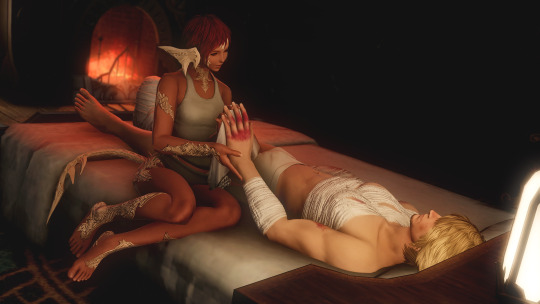
She would spend the following days caring for him, nursing him back to health, despite being many times reminded that she shouldn't consider that one of her duties. She was just too angry to do otherwise, having taken the measure of that man and seen him abused like that.
She wouldn't leave him side until he was restored back to health, but this prolonged intimacy would sow the seeds of a deeper affection between them.
Then, one day, coming back from the city with fresh produce she bumped into a group of adventurers and, in particular, a miqo'te girl by the name of D'jihlli Rhez.
In the following months, Wilan would keep coming and going from home, until one day a rumor returned in his stead. A rumor that he had plotted to kill Ul'dah's Sultana.
She refused to believe it. She couldn't, she knew Wilan, and either the rumors were wrong or there was a lot more to this story. She insisted on going on with her life, but even though he was only sporadically home, that house already felt somewhat emptier.

Having recently moved with her brother from Gridania to open a bar and having recognized in the melancholic eyes of that quiet girl a kindred spirit, D'jihlli insisted on befriending the auri girl. With much effort she convinced her to let her be introduced many of aspect of the modern adventurer's lifestyle. She lended her some of her earnings to let herself buy some new, trendier clothes, she invited her to hang out and chat at her brother's bar, and even to take part in Limsa Lominsa's night life.

After months of barely having made any progress, of having landed on Vylbrand's shores but never having really moved from there, eventually Delen finally managed to start like she belonged there. She had a friend, and she had started living her life again.
Then, the day came where she could find out by herself. Wilan had send word to Delen that he was coming home.
Wilan became part of their conversations pretty soon. D'jihlli, despite her lively and outgoing personality was actually a good observer, and noting the frequency with which she mentioned the hyuran man she started to suspect there were feelings between them. When asked directly about it, however, she denied.
D'jihlli figured she probably hadn't even realized it herself.

The man had taken a protracted absence, tangled in Ishgard's Thousand Years war and delaying his return even after his name back home had been cleared, but that still failed to explain his greatly different appearance. Delen could hardly see any trace of the man she once knew, cloaked as he was within an aura of formal gestures and polished language.
But she was determined to see through it. She sat him down with him, ale in hand, and wouldn't give up until she found out what was wrong.

As it would turn out, proven by the many traumas he had been forced to endure and crumbling below the weight of the expectations placed upon him, Wilan had created an "heroic persona" of sorts to wear like a mask in a hope to shield his true, much more frail self.
She managed to let him talk, and in doing so she had crossed one of the biggest boundaries they had between themselves. Despite neither of them having recognized it before, tonight they close like never before.
They felt connected.
And yet things certain feelings couldn't be just folded and put back into a heart.
Just for one night, at least.
That couldn't last. Wilan wouldn't allow it. He had always been very adamant about never getting tangled in a romantic relationship, as he believed it could never work with the role he had to play.
Delen knew it. She respected it. In the end, she even accepted it.
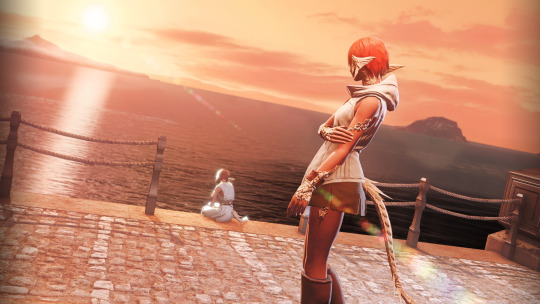
Luckily they would have to part ways for the time being, as Delen, having put together almost all her courage to board a ship again for the first time ever sicne she got to Vylbrand, had decided to finally agree to D'jihlli's offer to go for a tour of Eorzea's city-states.
Her first stop is, of course, in Vesper Bay. Now a couple years removed from her original arrival on the distant shores of Eorzea, Delen can't help picturing herself back in that moment, seeing herself as that young, small, weakened and lonely girl who, like in that song from the radio, was looking for her home beyond the horizon.
On her journey she would see firshand the many wonders of Eorzea, but also the many refugees camps, brimming with people escaped from the colonies in far greater numbers for the city-states of Eorzea to accomodate, crossing the Shroud after being denied stay, wasting away outside Ul'dah's walls.
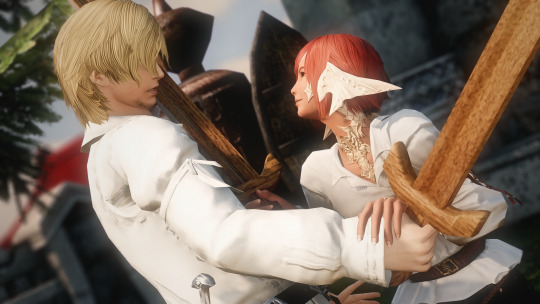
Her journey across the realm she now calls home gives her the motivation to take up arms and a battle training as well. She wants to be an adventurer, like the most important people in her life are.
And who better to teach her than Wilan? He's the strongest fighter she knows of.
But, of course, it would also be a chance for them to spend time together.
The two of them had an understanding that a relationship wasn't going to happen. They couldn't, however, just turn off the feelings they had for each other. Wilan gave her a Soul Crystal, trained her to be a Red Mage, and in the following months they grew close together, their affection finding another way to bring them closer despite the barricades Wilan had raised around himself.
Until, however, he realized they grew too close. And he got scared.
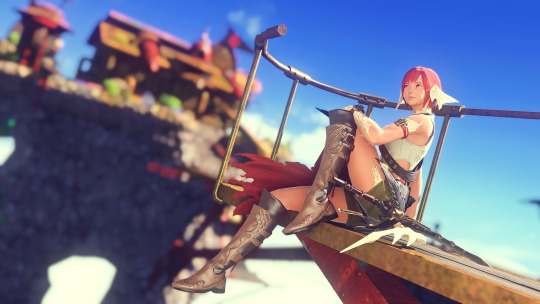
The both of them burned by the rejection, they took some time apart from each other. Encouraged by her friend Jill, Delen decided a change of air was what she needed, and the two of them decided to visit Ishgard, the city state that only recently ended its long isolationism and had opened its gates.
There, Delen would get accidentally tangled in a covert operation from the Redbills, whom she eventually decides to help. Her contribution would prove to be decisive for the resolution of their problems, and Leofard made her into a honorary Redbill and, as a more tangible gesture of appreciation, he gifted Delen one of their Manacutters.
The next time they met, it would be in a liberated Terncliff. Despite still bearing the scars from the prolonged occupation, the city by the cliffs was still home for Delen. She let Wilan accompany her around the city, dared briefly holding his hand. Tears shone in her eyes as she showed him the promenade from which she would look at the sea, down the cliffs.
She hadn't heard from Wilan in months, when he asked to talk to her. Their meeting was tense, awkward, somewhat cold. He however wanted to inform her in person: the Eorzean Alliance was pushing forward to liberate Werlyt.
But, as it would turn out, Baelsar was still alive, and he was collaborating.
She was home. However, politics had put Baelsar in charge of the newly liberated city, much to Wilan's protestations. They both agreed that for the time being it'd be better if Delen didn't move back to the city.
That was alright for her. What she wanted right now was to travel.
When she managed to see him, cornering him in his own room at the Studium, he was a wreck of a human being. Trembling, barely holding it together, he broke down in tears barely a moment after she closed the door of that room behind herself. She had seen the pressure he had been under before, but she had no idea just how bad it had gotten in the latest months, and he was facing it all alone, refusing to confide even in his closest friends, for fear that showing weakness to them might deprive them of a symbol of hope, and take them one step closer of giving in to despair.
And some months later, she would depart for another journey, although not under the best of circumstances. Wilan had sent word to be in Sharlayan, he wouldn't say much on the linkshell but he said it'd be safe here, she'd be able to quickly escape if things went wrong.
It would be some time before she had a chance to talk with him in person. The Warrior of Light had been running left and right across the world in the face of imminent disaster.
She spent that night with him, caring for him, listening to his worries, his fear, letting him vent his frustrations, his terrors. Encouraging him to indulge in a little bit of hope, in considering that not everything was lost like he thought, in imagining what he would like to do when everything would be over. When the world would be safe and there'd be no more need of Hydaelyn's champion.
Maybe they could be together, she dared to suggest.
He weeped. That would be nice, he dared to dream.

And then they departed. She saw him, leave the planed on a star vessel. She couldn't do much more than to pray for his safe return.
He did. The starship Ragnarok made its way back to Hydaelyn, welcomed by triumphant celebrations. He called her, on their linkpearl, made sure to let her know he was alright. The starship dropped the heroes of the planet off in Mor Dhona, and hopping on her manacutter she flew halfway across the continent to meet him there.
She found him, on the balcony of his room.
She all but jumped off her manacutter. He grabbed her.
And they kissed.
They didn't need to say anything else.
The world was saved, after all. The boundaries between them, removed. Maybe some day the need for a hero would arise again but for now, for now he was just another traveler.
And it was high time, Delen thought, that they had a vacation together.
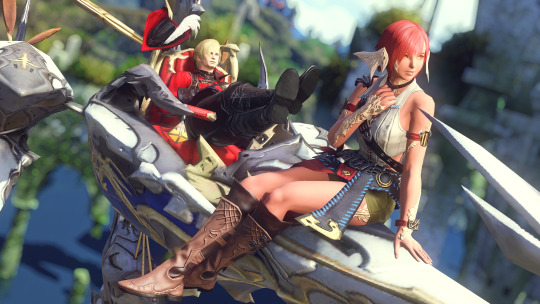
From here on out, much of the story is still unwritten. But despite any shadow that might loom on the horizon, the new day's dawn shines bright.
#FFXIV#Final Fantasy XIV#final fantasy 14#FFXIV WoL#FFXIV OC#FFXIV OC lore#FFXIV WoL lore#warrior of light#Au Ra#Raen#Au Ra Raen#Hyur#Hyur Wol#hyur midlander#midlanders today#gpose#gposers#WoLship#WoL x OC#werlyt#ffxiv endwalker spoilers#Delen#Wilan#aldarulia#AO3#ao3 fanfic#ffxiv fanfic#ffxiv fanfiction#fanfic
5 notes
·
View notes
Text
Why Israel Should Not Talk to the PA
The Palestinian Authority (PA) has let it be known that its 86-year old leader, Mahmoud Abbas, is prepared to talk to Israel’s caretaker Prime Minister, Yair Lapid, about a “diplomatic horizon” for the Palestinians. No doubt this is prompted by the planned visit of US President Joe Biden to Israel and the PA next week.
That would be a terrible idea.
Start with the fact that Abbas is in poor health, and the wolves are already gathering to pick the bones of his fat carcass (the PA is a money machine for those who are “connected.” Yasser Arafat died with a net worth of more than $4 billion, and Abbas is said to have at least $100 million salted away. Much of this came from you, American taxpayers). There is no reason to think that the dictator who follows will have any reason to live up to any promises Abbas makes. Not that the PA has ever kept any of its promises, starting with the ones made by Arafat in 1993, especially the one about “fighting terrorism:” rather than opposing it, Arafat planned, ordered, and paid for it. As far as we know Abbas has only encouraged terrorism, and paid the salaries of the perpetrators after the fact.
But the main problem with talking to the PA is that there is no coincidence of interests between Israel and the PA. If we draw Venn diagrams of the minimum demands made by the PA and the maximum concessions that Israel could afford to make (and vice versa), the intersections will be empty. There is no “creative” way to solve this problem.
For example, consider Israel’s most basic demand: the PA must stop paying the salaries of terrorists. Most Israelis would see this as a reasonable precondition for negotiations. But Abbas has consistently refused, saying that he would pay “every penny” to the prisoners, even if it meant cutting salaries to PA employees.
Any real peace agreement would also have to include the Palestinians dropping their demand for a “right of return” to Israel for the five million Arabs with refugee status. This too would be unthinkable for them, and is why they have always refused to agree that Israel has a right to exist as a Jewish state.
There are other issues, like Jerusalem, that don’t have compromise solutions.
Why is this so? Let’s look deeper.
Perhaps the Jews and Arabs of Eretz Yisrael in 1948 could have reached a compromise, if they had been left alone. But that was prevented by the manipulations of Britain, which wished to retain control of the region, and which encouraged the Arabs – both in Palestine and the surrounding Arab nations – to believe that they could have the whole thing for themselves. The Arabs in the region had also absorbed a vicious antisemitism, from Nazi propaganda during the war as well as from German Nazis who fled to the Middle East to avoid prosecution for war crimes.
In the period after the war, and especially starting in the 1960s, the Arabs of Eretz Yisrael became Palestinians. On the advice of the KGB they adopted the identity of a colonized third-world indigenous people fighting for their freedom against European imperialists (the Jews!). Arabs that had first seen themselves primarily as members of their clans living in “southern Syria,” and later, in the days of Nasser, as members of a larger pan-Arab nation, began to think of themselves as connected to the land of “Palestine,” which just happened to be coextensive with Eretz Yisrael. They developed a “Palestinian” narrative: they were the indigenous owners of the land, which was then stolen from them by the Jews.
They developed a unique culture (cult?) based on their dispossession and their hatred of the Jews that they believed had stolen both their birthright and their honor. Their heroes became those who struck back at the Jews as violently as possible. Their music, art, and literature is about their struggle against Israel. Everything bad that has happened to them is blamed on the original great crime committed against them, the Nakba, while their own behavior, no matter how violent or immoral, is justified by it. This fits in neatly with Western post-colonialism, which holds that a colonized people has a right to resist their colonizers by any means.
The PLO was an amalgam of terrorist organizations, originally a tool of the KGB, which was responsible for countless acts of terrorism directly against Israel or in the international arena. In 1982 its leaders – having been pushed out of Israel, Jordan, and Lebanon – were banished to exile in Tunis. But in 1993, Israel, under pressure from Americans who were naïve about Arafat and the PLO, committed the greatest strategic error in her history and allowed Arafat to set up the Palestinian Authority, taking control of most of the Arab population of Judea, Samaria, and Gaza (the PA lost Gaza to Hamas in 2007, two years after Israel withdrew). He quickly established an educational and media system to indoctrinate his subjects with the antisemitic Palestinian narrative. This succeeded brilliantly, and today Arab youths from the PA have become capable of slaughtering random Jews because they are Jews. And when this happens, they are lionized by the PA media.
If you understand this, you understand that asking the PA to stop paying terrorists, to accept Israel as the state of the Jewish people – and not as stolen Palestinian Arab property – is to ask them to give up their Palestinian identity. What makes them Palestinians and not just Arabs who happen to be in Eretz Yisrael is their opposition to the Jews that dispossessed them, and their righteous struggle to reverse the Nakba.
Their struggle will not end until they succeed in placing all of Eretz Yisraelunder Arab sovereignty. It’s often said that the Arabs illogically turned down several offers of statehood. But all of these offers postulated the continued existence of a Jewish state in part of the land; none of them included the “right of return” for the descendants of 1948 Arab refugees that would guarantee the end of the Jewish state and the reversal of the Nakba. There is nothing illogical about their choosing to continue the struggle rather than to give up their identity.
The State of Israel is and always will be in a permanent state of war with the PLO, Hamas, or any other group that sees itself as a Palestinian standard-bearer. The idea of a “two-state solution” – that an additional partition of Eretz Yisrael and the creation of a sovereign Palestinian state can end the conflict – is absurd, because it is based on a complete misunderstanding of Palestinian aspirations.
Joe Biden, or whoever pulls his strings, believes in the two-state idea, whether out of naïveté or anti-Zionism. American policy since 1967 – with the exception of the Trump Administration – has operated to try to weaken Israeli sovereignty in all the areas outside of pre-1967 Israel, including eastern Jerusalem. While the idea of “land for peace” might have borne fruit when the interlocutors were the Arab nations (although the jury is still out on the stability of the peace between Israel and Egypt), it cannot possibly succeed when the supposed “peace partners” are Palestinians, for the reasons discussed above. It’s also essential to note that, like the Golan Heights, the high ground of Judea and Samaria and the Jordan Valley must remain under Israeli control so that Israel can defend herself against attack.
Biden’s visit will certainly include pressure on Israel to make concessions relating to sovereignty in the territories and Jerusalem. Israel should resist the pressure, and also the idea of negotiations with the PA, unless – as will not happen – the PA agrees to stop paying terrorists and indoctrinating its population with the idea that murdering Jews is the highest form of Palestinian patriotism. Rather, Israel should reemphasize the most basic principle of Zionism – Jewish settlement in all of Eretz Yisrael – and act accordingly.
Abu Yehuda
21 notes
·
View notes
Text
By E. Tammy Kim
Last fall, when I was living in South Korea, a woman in Seoul was killed by her stalker, a co-worker, in the bathroom of a subway station. A friend and I went to see an informal memorial dedicated to the victim. We read piles of notes left by strangers: “Stop femicide.” “Your death is my death.” “The government, the courts, our culture of discrimination are guilty of murder.” The scene of the crime and the shape of the commemoration recalled another murder, from 2016, which had sparked Korea’s version of the #MeToo movement. Whatever remained of that feminist upsurge now felt eclipsed by widespread backlash; in 2022, a new President had been elected on a platform of unreserved misogyny. I went from the memorial to a bookstore and bought Kim Hyesoon’s most recent poetry collection, “After Earth Dies, Who Will Moon Orbit?,” which was inspired by her mother’s passing. “Mom, don’t read this book. It’s all sand,” the dedication says. The poems include bloody dramas, familial and cosmic, set in the space of the kitchen. It felt appropriate to read Kim in that moment, not as a manual for processing grief but as an extended fantasia of feminine rage.
Kim is sixty-seven years old and going on her fifth decade as a poet in the public eye. She has published more than a dozen books—of poetry and of unclassifiable texts, with titles such as “I Do Woman Animal Asia”—and won every major literary award in South Korea. Since her début, in 1979, in Literature & Intellect, a journal founded during the country’s authoritarian period, she has been at the frothy crest of many artistic and political waves. In her first career, as an editor under the dictator Park Chung-hee, she had to tell a Marxist economist, on his deathbed, that his book had not survived the censors’ redactions and would not be published. (She later wrote, “Behind his thin, wrinkly glasses, his tears flowed down to his ears.”) In the mid-eighties, she joined Another Culture, a pioneering feminist group that convened educational camps for kids, critiqued patriarchal norms in books such as “Equal Parents, Free Children,” and translated women from other countries, including the Indonesian poet Sugiarti Siswadi. “We were finding a Korean language for feminism,” Kim told me. In her second career, as a professor at the Seoul Institute of the Arts, she helped revive an interest in shamanism and other gynocentric folk traditions. Once, she followed an anthropologist friend to Mt. Halla, on Jeju Island, to commemorate a shaman’s death in a days-long kut ritual of singing and ecstatic dancing.
Poetry in Korea has been a vaunted form—and traditionally left to men. Kim broke away from the masculine styles that came before her, which tended to be either self-consciously political or “pure” and detached from the world. She smashed words together and savagely enjambed her lines. She ripped apart syllable blocks and turned the letters of Hangul into raw material for typographic play: “Mrsdustingarmselephantgod. Salivadropexplodeslikefreongas. / . . . Do you know all the dearest gods that are hanging onto our limbs?” She wrote about women’s bodies, in all their guts and gore. “Women poets start out writing like men,” Kim told me. “Feminism isn’t something you’re born believing. Feminism is going through life and changing yourself.” In “To Write as a Woman: Lover, Patient, Poet, and You,” a book of essays, Kim connects the experience of the woman poet to Princess Bari, a Korean folk heroine who remains loyal to her parents even after they’ve abandoned her. To be lost or left behind, or to disappear, is at the core of being a female artist, Kim argues. In Korea, the book became something like Hélène Cixous’s “The Laugh of the Medusa” or a less practical version of Virginia Woolf’s “A Room of One’s Own.” It was reissued last year, on its twentieth anniversary, and is being translated into English.
Kim has pursued a vernacular that’s intensely Korean yet open to the world. She reads widely in translation, and hosts obscure Catholic nuns, the Tibetan sages, Adrienne Rich, Sylvia Plath, Simone de Beauvoir, and Agnès Varda in the back of her head. About fifteen years ago, when her own work began to be translated, she attracted a following across North America and Europe. She grew especially close to her English translator, the MacArthur-award-winning poet Don Mee Choi. In 2019, the English version of Kim’s “Autobiography of Death” won the international Griffin Poetry Prize. The book is structured as a forty-nine-day Buddhist mourning ceremony for hundreds of teen-agers who drowned when a Korean ferry capsized five years earlier: “perhaps a doll, perhaps a human, perhaps you, perhaps me,” she writes on day forty-four. Kim’s latest translated work, “Phantom Pain Wings,” came out in May. These two volumes are the first and second of what Kim calls her “death trilogy.” (The book I bought in Seoul, “After Earth Dies, Who Will Moon Orbit?,” is the final installment.) “I don’t think I’ve ever comforted anyone with my writing,” Kim notes in an afterword to “Phantom Pain Wings.” “Perhaps literature crosses into a zone where consolation can’t intervene.”
What zone does Kim occupy? She has modelled an approach to language, and the writing life, for dozens of poets and other artists in Korea and in the diaspora. In 2019, her writing on Princess Bari inspired “Community of Parting,” a video installation by Jane Jin Kaisen, a Danish Korean adoptee who represented the Korean pavilion at the Venice Biennale. (A suite of poems titled “Community of Parting” is the centerpiece of “Phantom Pain Wings.”) A former student of Kim’s, Yoo Heekyoung, runs a poetry bookshop called Wit N Cynical, in Seoul’s Hyehwa district, which became a center of the #MeToo protests. When that movement got started, Yoo told a reporter that Kim’s “Autobiography of Death” was a top seller.
Since retiring from her job as a professor, in early 2021, Kim has kept mostly to her apartment, in Seoul’s Daehakro neighborhood, beset by undiagnosed nerve pain—which she interprets as a chronic female ailment—and insomnia. At night, she goes between her bedroom and her study, lying down and failing to sleep. She reads old novels all the way through (recently, she was back on Clarice Lispector, a favorite) and new fiction until it bores her (“It isn’t very good”). She watches competitive-singing shows on television, answers e-mails from three continents, and drafts stanzas longhand.
Several times last year, I caught up with her in periods of good health. One afternoon, she intercepted me at a subway stop near her home. She lives with her husband, the avant-garde playwright Lee Kang-baek, and their daughter, Fi Jae Lee, whose raucous line drawings and sculptures adorn many of Kim’s books. Kim was unmistakable, even in a face mask: jet-black, bowl-cut hair, architectural glasses, scarf, billowy pants, and platform sneakers. We were repeat patrons of Gupo Noodle, an old-fashioned restaurant that specializes in batter-fried squid and rice noodles in anchovy broth. We ordered makgeolli rice wine, which she barely touched and I ended up drinking alone. Kim speaks at an unhurried pace, and in a soft rasp. She told a tragicomic story about travelling with an incurable melancholic, a Debbie Downer-type who saw only pebbles, never pearls. Laughing and eating with Kim, I felt an alien-like attentiveness to my own body. I considered the peristalsis working noodles down my throat and the purple-blue blood racing back to my heart. “My bones are hollow like a flute / so every one of them can sing and whistle.” “The achy root has spread between the intestines like lightning.” I suspected that she noticed all this somatic activity in herself and, possibly, in me.
For Kim, poetry is “dancing,” “being a nameless animal,” “crossing the river of the grotesque,” “making a revolution in the realm of language,” and “a verb.” She has long concerned herself with animals, human and nonhuman. The collection “Poor Love Machine” is filled with rats and felines. “Sorrowtoothpaste Mirrorcream” contains a gray bear, fire ants, roe deer, an ostrich, a rabbit, and a duck. Her pig poems are among her most famous, and controversial:
This poem, “I’m OK, I’m Pig!” appeared in her 2016 collection, “Bloom, Pig!” The following year, the book won the 5.18 Literature Award, named after the Gwangju uprising of May, 1980, when South Korean soldiers, commanded by President Chun Doo-hwan and backed by the U.S., killed democracy activists. On Facebook, male critics slammed Kim as undeserving of the honor: her use of “surrealism” and visceral animal metaphors were an insult to the democracy movement, they said. It seemed like a clear case of jealousy, or gendered territoriality—but Kim was forced to turn down the prize and a much-needed cash award. Her brute-force poetry—what one critic called “the female grotesque”—was at once career-making and costly. To my ears, in English, it recalls the work of Lyn Hejinian (“The baby is scrubbed everywhere, he is an apple.”) and Dawn Lundy Martin (“Awareness of being in a female body is a tinge of regret.”).
Kim’s new translated work, “Phantom Pain Wings,” is heavy with birds and verbs. “It’s an I-do-bird sequence,” Kim writes. As the second book in her death trilogy, it responds to the loss of her father and the traumas of his generation: colonization, war, and economic development at all costs. “Daddy, in the room where you died / I become bird,” she writes. The address sounds tame in English; in the hierarchical ordering of Korean, it’s a crass impossibility. “In Korea, you can’t call your father ‘you’ or ‘other,’ but, in this book, I call my father ‘daddy’ and ‘you,’ ” she told me. “It’s my way of bringing myself and other women to an equal level with the father as an institution, mechanism, and authority.” Kim envisions this rebellion as a bird flapping its wings in flight.
Translation has a peculiar capacity to reframe an artist’s œuvre: an old work becomes new in another language and time. “Phantom Pain Wings” was published in Korea, in 2019; its English version took shape during the pandemic. I visited Kim’s translator, Choi, in 2021, at her home in north Seattle. Her desk was taken up by a large computer monitor (for working in two languages, side by side) and thick Korean and English dictionaries. I pictured her sitting there, bird-watching through the window, as she mastered Kim’s ornithology. Choi kept a diary, which serves as a translator’s note at the back of the finished book:
Choi told me, “Not only was this book difficult to translate but I felt a great deal of grief myself while translating. It’s not only about her father. In that long poem, ‘Community of Parting,’ she’s also addressing the source of her sorrow, and it goes all the way back to the Korean War.” A twentieth-century war, a twenty-first-century pandemic—overlapping eras of mass death. There’s also a poem eerily relevant to post-Roe America called “Abortion Boat.” It features Varda’s film “One Sings, the Other Doesn’t,” from 1977, about two friends in France who must travel abroad—one to Switzerland, and one to Amsterdam—to get abortions. The speaker of the poem is in, or next to, a tunnel—the Dutch canals, the birth canal, and the tubular branches of a tree:
As I run, the tunnel runs beside me like a dog
The tunnel cries and follows me, becoming very long
The woman who just had an abortion but still has a baby runs
When she exits the tunnel, her baby comes out
but when she enters the tunnel her baby sticks to her again
Kim has described her process with Choi as one of exchange. “I don’t edit her translations,” Kim told me. “I answer her questions. Translating poetry is the hardest thing in the world.” For “Phantom Pain Wings,” Choi asked more than usual about subjects and objects. The syntax of Hangul leaves much unsaid: subjects are implied; pronouns are rare. (Verbs, though, especially in Kim, are abundant.) Choi’s inferences weren’t enough. Who was doing the thing, and to whom was the thing being done?
Kim did not always have an answer to Choi’s probing questions. She had to think, and decide, before writing back. The English version became more than an update of the Korean original: it was its own, new thing.
Kim’s responses sometimes created new problems. How to lasso multiple perspectives, and subjectivities, into a single term? In Korean, she could get away with ambiguity, but, in English, the doer had to be named. For a couple of poems, Choi told me, the fix was an equation. In “Girl, Your Body Has So Many Holes for Straws,” the subject is “I + bird + music”; its actions include speaking, vomiting, and lying “prostrate like a corpse, hiding at the bottom of a lake.” In “Straitjacket,” parentheses achieve the same clarification. “Why does apple (I) need to apologize to apple (you)? / Apple (you) and apple (I) are apologies (for what)?” These markings echo the playful, mathematical vocabulary of the Korean modernist poet Yi Sang, also known as Kim Haekyeong, whom Kim adores and pays tribute to in the book. One poem is titled “Again, I Need to Ask Poor Yi Sang.” In another, Yi’s pathbreaking “Crow’s Eye View” becomes “Crow’s Eye View 31”:
13 birds keep flying up till they can’t be seen from below
. . .
I want to keep writing ruthlessly about all 13 birds
but that wouldn’t be polite, for they’ve been endlessly patient
and it wouldn’t be polite to Kim Haekyeong either who wrote the same
line— . . .
I don’t understand what these phrases specifically mean. (It’s reassuring that Kim occasionally had to mull her own intentions.) But they have an additive effect.
There is no thematic break or stylistic rupture in Kim’s poetry, despite the length of her career. The kitchen remains bloody and agonistic, demanding the preparation of yet another family meal. Knives and carcasses and dark orifices exist in otherworldly spaces. “Moon is shining like the lens of the patient’s eyeball / and I’m sitting on the white of his eye / examining his sadness,” she writes. Objects are extruded and sheathed. “A pair of fish-bone-shoes you can slip onto bare feet.” “Spiky sprouts burrow through your teary eyes.” Animals, real and mythological, fit inside one another, like turducken: “A rat / devours a sleeping white rabbit . . . . A rat devours a piglet that has fallen into a pot of porridge.” She captures the anger I detected in Seoul, which every woman has learned to gulp down. We are better off than we were when Kim started to write, no doubt. Yet we are still that rabbit, that punctured foot, that floating object compelled to reproduce.
One day, Kim and I rode a “village bus” (the rickety public equivalent of a hyper-local dollar van) up a steep incline to Gilsangsa, a Buddhist temple in Seoul. Gilsangsa is small and new and used to be a barbecue restaurant before coming to house an order of robed vegetarians. Kim and I walked the verdant grounds. We admired the low walls of ceramic tile and clay and circled a seven-tiered stone pagoda. Rain arrived, first in droplets, then in blocks, overwhelming our umbrellas. As we scampered downhill in muddy shoes, we were splashed by luxury S.U.V.s pulling up to gated houses. (The area has long been home to chaebol executives and retired authoritarians.) My Korean became more tentative in the din of the storm. “I like your accent and the mistakes you make. You sometimes use the wrong word,” she once told me. I was mortified, but convinced myself that it was actually a compliment—a poet taking pleasure in the jagged accidents of language.
We last hung out in late September, when she and Choi did a reading at the Seoul International Writers’ Festival. Kim spoke into a microphone as Choi’s translations were blown up on a pink-tinted screen behind her. The poet Kim Haengsook and several friends from the publishing world were there, as were Kim Hyesoon’s daughter and Choi’s husband. All but two of us were women. During Korea’s #MeToo movement, “there were so many accusations made and so many men who disappeared,” Kim had told me, that “when you open a literary magazine today, everyone’s a woman. Even the novelists.” This felt very true. The writers winning awards, getting buzz, and getting translated were mostly women, and often quite young—a second generation influenced by Kim. I thought of Lee Soho, whose raw début, “Catcalling,” was published in English, in 2021. I could imagine Kim dispensing the advice that appears in one of Lee’s poems: “You know I read a lot of debut collections these days. Listen, being a poet means going crazy. . . . Kill all your literary heroes and jump over our dead bodies. . . . hang on the edge of poetry. Then take another step forward from there.”
Our post-festival group walked to a Japanese restaurant for dinner. We sat at a row of tables along a linguistic gradient: the native Korean speakers on one end, then Kim’s daughter and Choi and me, then those who were English-only. We clinked tiny cups of sake and shared donburi bowls of silken eggs, braised meat, and seafood over rice. Kim was the doyenne of the festival, the mother of our feminine chatter. I remembered an old poem of hers, “The Story in Which I Appear as All the Characters 3.” The speaker of the poem is a forty-year-old woman, a child not yet born, and an old woman—all of them Kim. The poem ends:
We are stacked like three spoons
On top of a pillow
we turn our faces together
The forty-year-old-me in the middle
grinds her teeth saying,
I’m scared I’m scared
1 note
·
View note
Text
Flash on Thestrals

Credit for the picture: https://www.hp-lexicon.org/creature/horse/thestral/
They are bloody creepy badasses, right? Invisible, unless you’ve consciously witnessed someone kick the bucket, and pulling the Hogwarts carriages from the station to the castle and back.
All right, let’s not get overexcited and do things properly, but, for once, in a short piece of writing. More like a brainy burp, if you'll allow me.
About Thestrals
What does Newt’s book say about them? Well. Nothing. Or, to be more accurate, there is no entry for ‘Thestral’. When you look up ‘Winged Horse’, there is one phrase (not even a sentence!): ‘... and the rare Thestral (black, possessed of the power of invisibility, and considered unlucky by many wizards)’ (Scamander, 1927). That is all in official magizoological literature. Quite meagre, eh?
So we’ll have to trust Rowling, I guess. What do we learn in Care of Magical Creatures? That’s in chapter Twenty-One of Order of the Phoenix: They prefer the dark. The Forest is their natural habitat. They are rare, Thestrals, and Hagrid is probably the only one who has managed to train a herd. They are attracted by the smell of raw meat, which they eat, as they are scavengers. We know Hagrid feeds them cows. He calls them with a sort of shrieking cry resembling that of a monstrous bird. They have blank, white, shining eyes, dragonish faces, long black tails, leathery wings, and skeletal bodies. They do tear the flesh from the carcasses they eat with their pointed fangs. They are ‘dead clever and useful’, and besides pulling the school carriages, the only job the Hogwarts herd has is to take Dumbledore on his longer journeys.
So basically they look very Cocteau-ish. Cocteau was that French author-painter-cineast who explored the world between life and death in many of his plays and films, and, incidentally, often used a horse-head to materialise this (see picture below).
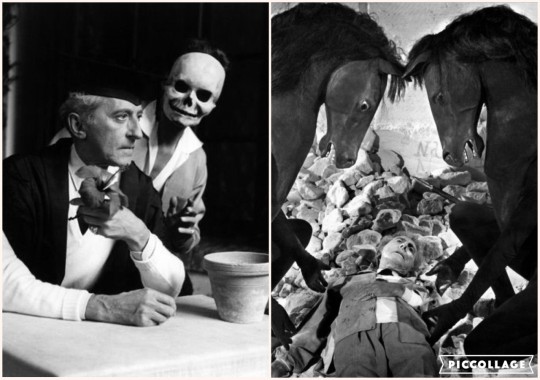
The Ministry of Magic has classified Thestrals as dangerous (XXXX). Hagrid says it’s because of the reputation they have of being bad omens, not because they are more dangerous than other creatures. They simply look after themselves, and retaliate if you annoy them. Natural.
The Hogwarts herd started with a male and five females. Among the herd, Hagrid’s favourite is Tenebrus, who was the first to be born in the Forbidden Forest. Once they are tamed, Thestrals will never get their rider lost. Their sense of direction is amazing, and you only need to tell them where you want to go to be brought there.
Additional information can be found in Chapter Thirty-Three of OoP: Apparently, Thestrals understand human speech, and they do fly fast, hardly beating their wings. When they touch ground, there is no thud, because they do it lightly as a shadow.

Thestrals and Death
Apart from their being rather otherworldly in appearance, or, I’d rather say back-from-the-deadly in appearance, Thestral have that ominous trait of being invisible to mortals who don’t have an understanding of death through seeing someone die. Through this, Rowling is able to take the reader onto a path to comprehend the variety of attitudes humankind can display when confronted to death as a concept before it can become a reality.
Death should be a reality to anyone at least in a biological sense because everything we eat was once living, and all our wooden furniture, houses, and musical instruments, for instance, are actually made of slaughtered trees or dead herbaceous plants.
On a humanly biological level, death is not always a reality. As in, many people don’t come to terms with the fact that we are all going to die one day, because we are animals. Whether there is life after death or not is another question, which can be biologically answered (yes, there is, because your matter is being recycled by other living things), or spiritually answered (yes, there is, because you believe in a myth/religion that tells you that there is life after death in some form; or no, there isn’t, because you think you vanish entirely into nothing the moment you die - this, incidentally, sounds very weird to me, because of the laws of conservation of mass). Death is fascinating to some, scary to some (probably most people - when they are asked about it, they often reply, like Voldemort, that there is nothing worse than death - OoP, chapter Thirty-Six, The Only One He Ever Feared), but unless you come to terms with it in some way, there is always that little pang when you think of your last moments and the length of your life on the planet.
Thestrals are some sort of way Rowling has to show us this variety. I think it is somehow summed up in that dialogue Harry and Hermione have while coming back from Hagrid’s lesson on Thestrals (OoP, Chapter Twenty-One, The Eye of the Snake):
‘[...] but Thestrals are fine - in fact, for Hagrid, they’re really good!’
‘Umbridge said they’re dangerous,’ said Ron.
‘Well, it’s like Hagrid said, they can look after themselves,’ said Hermione impatiently, ‘[...] but, well, they are very interesting, aren’t they? The way some people can see them and some can’t! I wish I could.’
‘Do you?’ Harry asked her quietly.
She looked suddenly horrostruck.
‘Oh, Harry - I’m sorry - no, of course I don’t - that was a really stupid thing to say.’
‘It’s OK,’ he said quickly, ‘don’t worry.’
Hermione is clearly fascinated by death and its various personifications; that’s her ‘brainy’ side. Harry on the other hand has already started on the path to get himself acquainted with the reality of death, not only because he has no parents left (but no real recollection of them either, or conscious knowledge of death - he has, I think, a conscious knowledge of absence), but because he witnessed Diggory being killed in June the year before. From that moment on, he’s been on a journey towards an opening of mind and towards an acceptance of death that will culminate with his walking into the Forest at the end of Deathly Hallows. Apart from Thestrals, in his fifth year, he meets Luna, who has her own journey to make since her mum died when she was nine (so basically about 5 years previously, since she’s 14-ish in OoP, being a fourth-year). She seems to have come to terms with death and in her own way helps Harry. For instance, after Sirius’s death, she is the only one with whom he can discuss him, to his own astonishment. I’ll dwell about Luna’s relation to death in another paper, I think. It deserves it.
We cannot see Thestrals, but we cannot see death either (Willson-Metzger, no date). So in that sense they are a sort of death creature, yet they are most alive. They have a part to play in the unfolding of the plot in OoP as in they allow the start of Harry’s friendship to Luna, but then provides means of transport to the Ministry for the Dumbledore’s Army nucleus, giving those who cannot see them some sort of way onto the path Luna, Harry, and Neville have already undertaken.

Are there such horses in Muggle mythologies?
Let’s do this quick: no.
BUT you couldn’t imagine I could let this be. So I searched my books (I have a pretty number of them), and the internet. I stumbled upon a paper by Leah on Mugglenet (2004) about a Celtic legend involving… tadaaaa… a horse. Well yeh, like most legends in these parts of the world, you’d tell me, because it’s a means of transport, human’s best friend, was revered for centuries, buried with their owners, or having their own burial services. Yeh.
At first the telling of the story was confusing because it involved a kestrel, which is a bird and a Quidditch team (and has a vague resemblance to thestral), but the writer was talking about a horse. So I looked the story up from the source she mentions (Berresford Ellis, 1999). I also checked the French version of the tale (Luzel, 1887). The details vary, but the essentials are coherent. My point is that Leah has a point. There are similarities between the horse in the story she mentions and Thestrals.
So. To make it short, it’s the story of N’oun Doaré (means ‘I don’t know’). He was a child when he was found in a hedge by Bras, a noble man from Brittany. He and his wife Anvab adopted him and raised him. The boy was called N’oun Doaré, because the only thing he could reply to any question at the beginning was ‘I don’t know’. When he was of age, the boy was sent by Bras to a cousin of his who was a renowned druid, until he was seventeen (the same ‘coming of age’ as in the Harry Potter books). Then Bras officially adopted N’oun Doaré as his heir, and went to town to get him a sword and horse. The horse they got on the road from a man clad in black, who was leading a sorry skeletal horse indeed, that looked like the Mare of Death, but N’oun Doaré chose that one. The man told him it had a magical halter. It was full of knots, and each knot untied would mean the mare would transport the rider wherever he wished, by magic. The French version I read said the mare would take the rider 1,500 leagues from where he was. This reminds me strongly of the capacity Thestrals have to travel wherever the rider asks them. The rest of the story is worth reading, but has no more to do with a thestrally horse.
Did Rowling know about this story? I don’t know. She is learnt in French, in legends, and many other parts of culture, so maybe. Anyway, it is interesting to know that such characteristics as, for instance, the ability to go to the bidder’s chosen place by magic, are shared by other literature.
Somehow, the fact that Thestrals are quite unique makes them even more interesting. So I guess there might be more to come about them.
If you have info about thestrals or thestrally creatures in any mythology, pray tell me in the comments sections!

Sources
Mugglenet paper by Leah: https://www.mugglenet.com/2004/10/the-legend-behind-thestrals/
Berresford Ellis, P. (1999; 2002). The Mammoth Book of Celtic Myths and Legends. Robinson. London. 463-483. Retrieved from: https://yes-pdf.com/book/4406
Luzel, F.-M. (1887). Contes Populaires de Basse-Bretagne. Retrieved from: https://fr.wikisource.org/wiki/Contes_populaires_de_Basse-Bretagne
Rowling, J. K. (2003). Harry Potter and the Order of the Phoenix. Bloomsbury, London.
Rowling, J. K. (2007). Harry Potter and the Deathly Hallows. Bloomsbury, London.
Scamander, N. (2001; 2018; [1927][J.K. Rowling]). Fantastic Beasts and Where to Find Them. Bloomsbury, London, in association with Obscurus Books, 18a Diagon Alley, London.
4 notes
·
View notes
Note
Please share pig pictures! Also.. are you open to taking questions regarding pigs? We’ve been raising feeder pigs for the past two years and I love them. And we want to eventually get sows and do the whole process but that’s a big jump.
Very interested in how your experience raising livestock influences the way you experience fantasy literature where there are rural farming communities featured! Do authors get a lot right or wrong? What pops out to you? Thinking specifically of Wheel of Time but also there was a swine herder in The Kingkiller Chronicle.
Also interested in how your experience raising livestock influences the way you think about Food Science.
This is a great question! I’m completely down for questions about pigs! However I’m not sure how entirely helpful I can be as we’ve been raising pigs in my family for over like 60-70 years or so and primarily do show stock but I’m sure I can answer something!
I think the wheel of time has definitely been one of the best in terms of small agricultural communities in fantasy. Everyone knows everyone and in the two rivers specifically they’ll help their neighbors out. Not to mention the large number of related families which is such a thing in smaller rural communities.
Additionally my family also raise cattle (again mostly showstock) and i think the thing most fantasy authors dont do right with livestock is that the characters don’t seem to have as much of a connection to their livestock. Like (and maybe it’s just us) but all of our pigs have names because they were our 4H animals and like i know that some of the pigs like being scratched behind their ears or some will come when you call their names or that cow was my show cow and now look at her! Or look out for 626 shes a mean old cow. I just don’t see that in fantasy books as much but it’s definitely something that is realistic. The animals have big personalities and if you’ve grown up raising them you’ll understand their personalities. I guess it’s kind of shown with Rand and Bela and I haven’t read kingkiller chronicles so I can’t speak on that. But like GOT and the dragons is the closest I’ve seen. Daenerys like talks to her dragons and whatnot (I think. I’ve only seen clips of the show.)
And growing up in an agricultural background so far has shown how much I already know about the food science industry. Like in my intro class half the stuff she talks about I already knew from 4H or FFA or just absorbed over the years. I think my agricultural background is something that shows in like discussions especially. Like I already know how to tell the grades of meat because as part of having cattle at the fair, a vet would come and measure the marbling of the cows and the top carcass value would get a prize. Plus I’m more desensitized to gross things. So when i have to take bio and dissect an animal or something I won’t be grossed out because like I’ve seen a partially reabsorbed mummy piglet who died in the womb. It was disgusting but also cool.
But also one of the things I hope to work on some day is food deserts in agricultural communities. There are a number of small towns in my state that have to go an hour or more to get fresh produce which makes them a food desert. However these people going that distance also have farms and are surrounded by crops 3/4 of the year. When you think of food deserts you might think of like other continents but not in a farming community and yet there it is.
#asks#any pig questions you can absolutely message me about#I can talk more but I won’t#keepmissaustinweird
4 notes
·
View notes
Photo
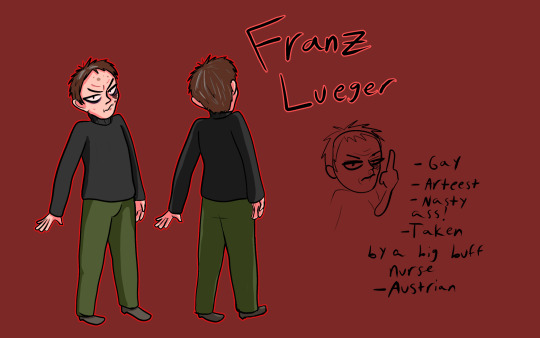
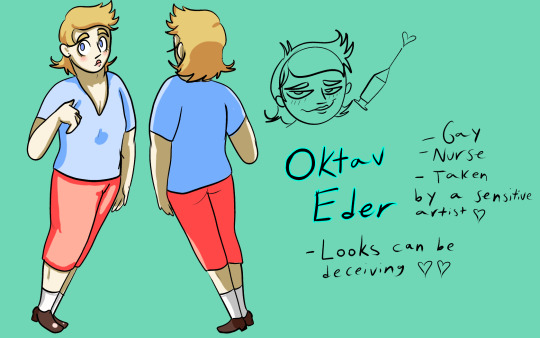
I just realized I’ve NEVER posted these refs on here so here’s the quick summary of my Currently Untitled Vienna Actionism Story
Franz Lueger was born in 1944 and grew up the son of a repairman and a librarian. He had an elder sister who died in a car accident and comparatively Franz was very sickly and sensitive. He attended university in Vienna to study classical literature but ended up accidentally witnessing an outdoor performance art piece titled Die Blutorgel (The Blood Organ) which involved like, blood painting and lamb carcasses and stuff. Anyway he dropped out of uni and became fascinated with the Actionist movement, which was basically a Vienna-exclusive gore-and-excrement-heavy relative to the Fluxus movement.
He did “actions” that largely involved body-painting and self-mutilation for several years. He also briefly dated a British guy named Melvin who ultimately dumped him in favor of a normal life. After an incident involving his achilles tendons, Franz met nursing student Oktav Eder, who was immediately smitten and proceeded to poison him so he’d stay in hospital longer, at the prompting of his imaginary friend/consciousness represented by a gay porn star named Lula Vice. Of course when Franz found out he was being poisoned he IMMEDIATELY fell in love and the two of them had a fake wedding at an abandoned church in 1975.
They’d then leave Austria out of fear of being arrested and move to Berlin, where Franz would begin painting. He’d develop a cult following as well as love from many famous or semi-famous people. Over time Oktav would become incredibly suspicious of him cheating and the two would basically bicker nonstop and then fuck it out. Franz died in 2016 after a heart attack.
2 notes
·
View notes
Text
3/11/2022
My anxiety has been bad again but not as bad as in august, holding on. I saw Behemoth, Carcass and Arch Enemy yesterday and it was so amazing! Front row business as usual. I managed to catch a guitar pick from Arch Enemy and I don't know what to do with it, maybe turn it into a necklace? Can you drill a small hole on a guitar pick without it cracking?
Also bought a very cool Arch Enemy tour shirt. I would've liked a new Behemoth shirt but no I already have two and I am a student I cannot afford many Things.
This week is weird, i flew back to finland for the concerts, i saw Heilung and Eivør on sunday and loved it too.
I have anxiety of my future, i am graduating next year and i don't know if i can work due to my mental struggles or if i even could get a job and if so, what am i qualified of doing as a literature major with history, feminist societal studies and violence sociology as side subjects? Library? Random event organizing? Culture things? Museum work? The chaotic not-knowing brings me so close to a breakdown.
#mentally ill#panic disorder#general anxiety disorder#university student#master's degree#university#literature student#uni student#studybrl#arch enemy#behemoth#carcass band#heilung#eivør#metalhead
2 notes
·
View notes